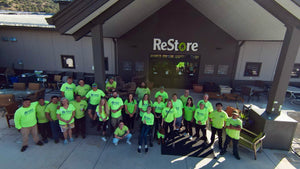Schwartz: Affordable Housing Isn't Solved in Your Backyard; It's Solved in Our Backyard
Aspen Skiing Co. President Mike Kaplan said it best in a meeting with Pitkin County Commissioners earlier this month when he urged the commissioners to take “unpopular positions” fundamental to our sustainability and progress.
Lately, it’s been easy to blame Aspen Pitkin County Housing Authority (APCHA) for our affordable-housing crisis, but that will not result in any real solutions. It is clear that there are efficiencies to be made in how APCHA oversees its housing inventory, enforces its rules, and manages deed-restricted properties. But let’s be honest — it’s the development-approval process that is truly broken.
In order to create enough workforce housing that will support and sustain our regional economy, we must have new land-use policies and visionary leadership. We don’t have a viable economy without a workforce, and we don’t have a workforce without housing. Plain and simple: We need to find a balance.
APCHA was built on a reality that existed 40 years ago when land, water, and roads weren’t a problem, but they are scarce and challenging problems in 2023. It’s time that we come to terms with the fact that we have to shift our perspective if we want to impact our affordable-housing shortage. In order to do this, we need to first figure out the valley’s carrying capacity and then revise our land-use policies in order to better manage future development.
A shift in perspective starts with believing and then acting as if what’s good for the goose is good for the gander. Developers bring valuable dollars into our valley and often wield a heavy hand when it comes to approvals from the local government. The myth is that, unless governments cater to the demands of developers, we are at risk that

they’ll pack up their investors and construction crews and move down the road to communities that welcome them.
But the harsh reality is we need to all agree that there are limits in our ability to cope with the pressure of new development. We can’t afford to keep approving new projects with only 10% to 30% of the units being devoted to housing for locals.
The current system is overly invested in high-dollar absentee ownership, which puts more pressure on our local workforce and exacerbates traffic issues at the expense of local residents. We have to break this cycle that is not serving us. We should expect and demand more — throw a dart — maybe the number should be 50% of new projects dedicated to residents, while still offering tools and incentives that keep development in the region attractive.
We have to change the way we do business, and that can be unpopular in the face of the loudest voices and the deepest pockets. We have to inspire our decision-makers to recognize and appreciate that the sustainability of our economy, quality of life, and workforce should be our priority, and that it is going to require compromises.
We are uniquely positioned to talk about solutions from a regional perspective, and we’re at a point where we have to have those conversations outside of the bubbles drawn by our county lines.
Everyone is entitled to see themselves as a stakeholder in their community and care about what is best for their community. Yet it isn’t just up to Aspen to solve the “Aspen” problem or Glenwood to solve the “Glenwood” problem. Even if we could provide more housing in Pitkin County, not every person who makes the commute to Aspen wants to live there.
When we function as a regional group of stakeholders, we start to collectively take responsibility and invest in what is best for every community from Parachute to Aspen.
I’m often asked why affordable housing is such a circular conversation. It’s not unlike the endless “Entrance to Aspen” discussion. There are no easy answers or silver bullets. These problems take collaboration and compromise, and it’s hard to do either when stakeholders are married to thinking about the problem only as it relates to their needs or perspective. For the sake of our region, we can start to work together as stewards for the generations to come.
On March 15, Habitat for Humanity — supported by The Aspen Times, Glenwood Springs Post Independent, and a host of regional partners — will convene a regional, affordable-housing summit: “Solving the Housing Crisis: A Regional Summit on Equitable Solutions.”
We look forward to bringing together new energy and committed partners to spark inspiration and activate real solutions to one of our valley’s most pressing problems. Stay tuned for more details in the coming weeks.
If there are questions that you have about affordable housing that you would like to see addressed in our monthly column, please send me a note. If there are topics that you think are important to include in our summit, I would like to hear from you at GailS@HabitatRoaringFork.org



.png)